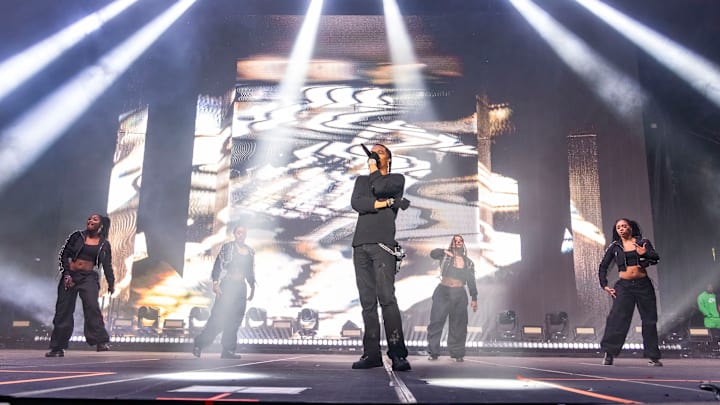Hip-hop culture reflects the experiences and struggles of marginalized communities, especially African Americans and Latinos, who faced social and economic challenges in urban areas. Hip-hop culture also offers a platform for creativity, innovation, empowerment, and a critique of mainstream society and politics.
In the past 50 years, hip-hop culture has evolved and spread worldwide, influencing different regions and genres of music, art, and society. Hip-hop culture has also adapted to local contexts and cultures, creating diverse and unique styles and subcultures.
Africa
In Africa, hip-hop culture has been embraced by many young people who use rap music and graffiti art to express their views on social issues, such as poverty, corruption, democracy, and human rights. African musical traditions, such as Afrobeat, highlife, and reggae, have also influenced hip-hop culture.
Some prominent African hip-hop artists include Fela Kuti from Nigeria, Youssou N'Dour from Senegal, K'naan from Somalia, and Sarkodie from Ghana.
Asia
Hip-hop culture has gained popularity in Asia due to the emergence of Korean pop (K-pop) music, which incorporates rap, R&B, and dance elements. American hip-hop legends like Dr. Dre, Snoop Dogg, and Eminem have also influenced K-pop music. Some of the most famous K-pop groups that feature hip-hop elements are BTS, Blackpink, Big Bang, and EXO.
Europe
Europe has a rich and diverse history that has influenced its hip-hop culture. The genre has been used as a tool for social activism and integration, particularly among communities of immigrants and minorities. Europe has produced notable hip-hop artists such as Stromae from Belgium, MC Solaar from France, Dizzee Rascal from the UK, and Die Fantastischen Vier from Germany.
Latin America
Latin America has a rich heritage of music, which has greatly influenced its hip-hop culture. Genres such as salsa, cumbia, and reggaeton have been incorporated into hip-hop music in the region. Moreover, hip-hop culture has been used as a means of resistance against oppression and violence and as a way of celebrating identity and culture. The Latin American hip-hop scene boasts many talented artists, including Calle 13 from Puerto Rico, Ana Tijoux from Chile, Residente from Colombia, and Emicida from Brazil, who have significantly contributed to the genre.
Celebrating the 50th anniversary of Hip-Hop
To celebrate the 50th anniversary of hip-hop culture in 2023, many events and exhibitions have been organized worldwide to showcase the history and impact of hip-hop culture.
Hip-hop fans in Uganda celebrated the 50th anniversary of the genre with a two-day event at Alliance Française in Kampala on October 21-22, 2023. Freestyle rap battles, hip-hop dance exhibitions, and performances from underground artists from Uganda, Kenya, and DR Congo marked the occasion—the event aimed at showcasing the significance of hip-hop culture in catalyzing social change and empowerment in Africa.
The BET Hip Hop Awards 2023 celebrated 50 years of hip-hop by honoring the genre's past, present, and future. The show featured performances by some of the most influential and famous hip-hop artists, newcomers, and rising stars. The show also recognized the achievements and contributions of hip-hop pioneers, legends, and icons, such as Marley Marl and So So Def Records. The show was a celebration of hip-hop culture, music, and art and a tribute to the legacy and impact of hip-hop on the world.
New York City, being the birthplace of hip-hop, has always been at the forefront of promoting this music genre. In a recent effort to celebrate the rich culture of hip-hop, the Office of the Mayor and The Hip Hop Museum partnered to host a 12-month event that included various community activities throughout the city's five boroughs. This event aimed to bring together people from different walks of life to celebrate the diversity and richness of the hip-hop culture.
In Los Angeles, the Grammy Museum presented a special exhibit called "Respect: Hip-Hop Style and Wisdom" that explored the cultural impact and legacy of hip-hop through artifacts, photographs, videos, and interactive displays.
In Cape Town, South Africa, hip-hop artist and activist Dope Saint Jude performed at the Cape Town Jazz Festival, showcasing her unique blend of rap, electronic music, and African influences.
In Cairo, Egypt, hip-hop artists and graffiti writers collaborated to create a mural celebrating the region's history and diversity of hip-hop culture. The mural featured portraits of influential figures such as DJ Kool Herc, Grandmaster Flash, Tupac Shakur, MC Lyte, and Lauryn Hill.
Hip-hop culture is an all-encompassing way of life that has served as a source of inspiration for numerous individuals across the globe. It is much more than just music; it has influenced art, fashion, and society for over five decades.
This vibrant and dynamic culture has transcended boundaries and surpassed barriers, creating a diverse and inclusive community of fans, artists, and activists who share a common love and appreciation for the genre. From the Bronx to Tokyo, hip-hop culture has left an indelible mark on the world, inspiring individuals to express themselves creatively, push boundaries, and make positive changes in their communities.
